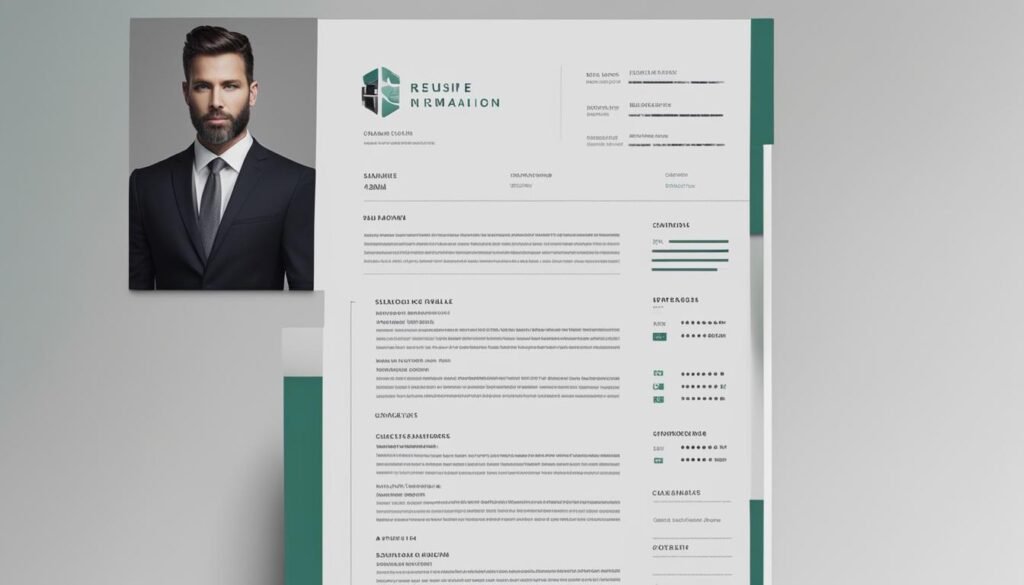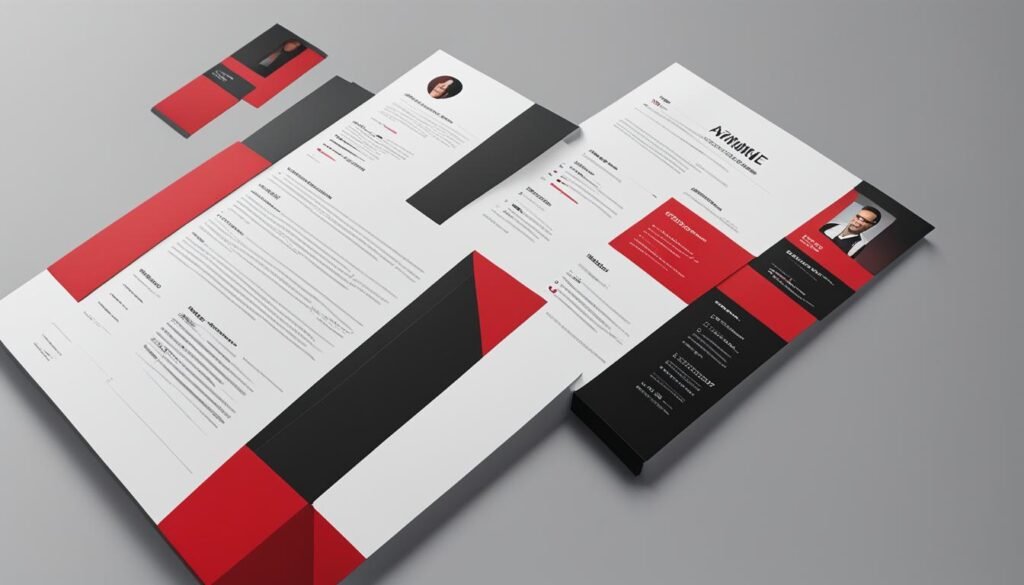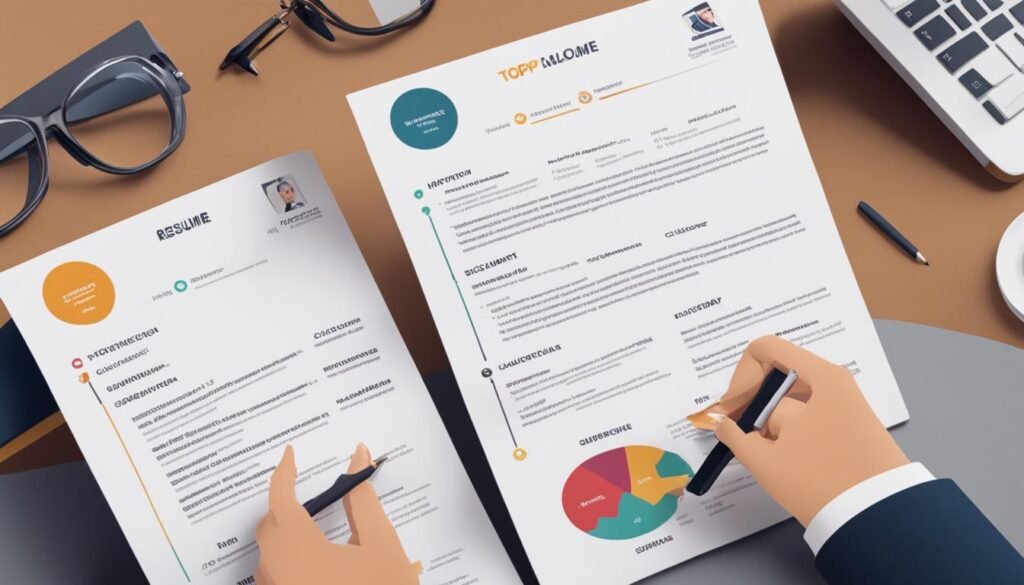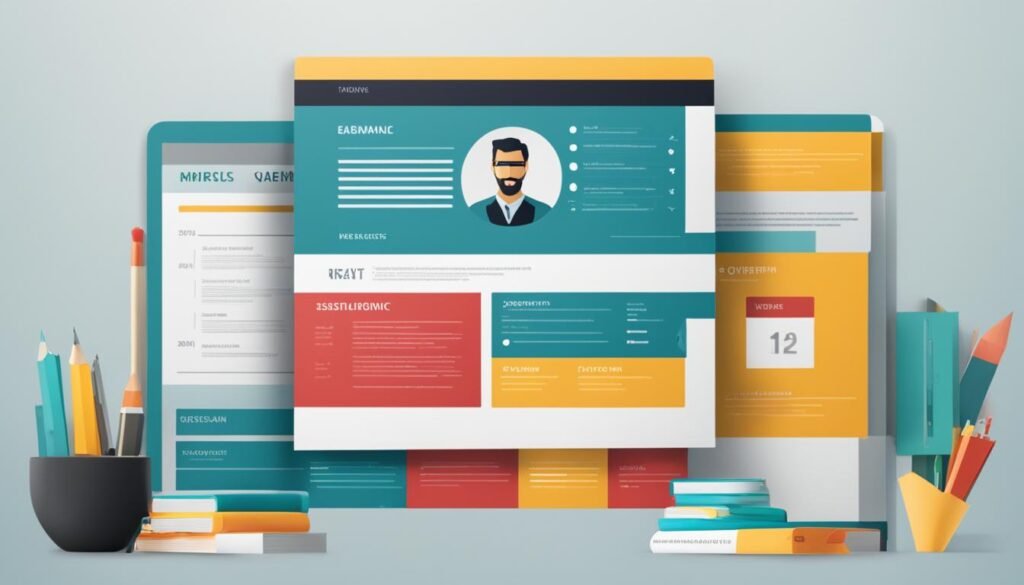In today’s competitive job market, having a well-crafted resume is essential. But with so many different sections to consider, it can be challenging to know which parts are the most important to include. Whether you’re a seasoned professional or just starting your career, understanding the key components of a resume can help you make a strong impression on potential employers.
So, what are the most important parts of a resume? Let’s explore the essential sections that can make your resume stand out from the rest:
Key Takeaways:
- Include your name, contact information, experience, skills, and education in your resume.
- Your name and contact information should be easily accessible at the top of the page.
- A resume headline can be beneficial in grabbing the reader’s attention.
- A resume summary provides a concise overview of your skills and experiences.
- List your past jobs and internships in the experience section, highlighting key job duties and achievements.
Name and Contact Information
The first section of your resume is dedicated to providing your name and contact information. This is essential for potential employers to easily identify you and get in touch with you if they wish to proceed with the hiring process.
Include your full name, phone number, email address, and LinkedIn profile URL at the top of the page. Additionally, if you have a personal website or portfolio that showcases your work, you can include a link to it as well.
Having your contact information readily available ensures that recruiters and hiring managers can easily reach out to you for further discussions or interviews. It also presents a professional and organized impression, demonstrating your attention to detail and your readiness to engage in the hiring process.

Example:
Your contact information should be prominently displayed at the top of your resume. Including your name, phone number, email address, and LinkedIn profile URL ensures that employers can easily reach out to you for potential job opportunities or follow-up conversations.
Table:
| Contact Information |
|---|
| Name: John Smith |
| Phone: (555) 123-4567 |
| Email: johnsmith@example.com |
| LinkedIn: linkedin.com/in/johnsmith |
Resume Headline
When it comes to creating a standout resume, one section that can make a significant impact is the resume headline. A resume headline is a short description that introduces you to the reader and instantly grabs their attention. This optional section can be a game-changer in showcasing your skills, experiences, and achievements right at the beginning of your resume.
Unlike the traditional objective statement that focuses on what you want, the resume headline focuses on what you can offer to potential employers. It serves as a concise summary of your professional identity, highlighting your key strengths and qualifications that make you a perfect fit for the job.
When crafting your resume headline, you can include relevant job titles, experiences, skills, or achievements that align with the requirements of the position you’re applying for. By tailoring your headline to the specific job, you increase the chances of capturing the reader’s attention and making a positive first impression.
Example Resume Headline:
“Accomplished Marketing Manager with 5+ Years of Experience in Driving Business Growth and Developing Innovative Marketing Strategies”
| Resume Headline Components | Examples |
|---|---|
| Job Titles | Marketing Manager, Software Engineer, Sales Associate |
| Experiences | 5+ Years of Experience, Former Project Manager, Seasoned Customer Service Representative |
| Skills | Expert in Digital Marketing, Proficient in Python, Strong Communication Skills |
| Achievements | Increased Sales by 30% in Q3, Led Successful Multimillion-Dollar Projects, Award-Winning Graphic Designer |

Remember, your resume headline should be concise and impactful, capturing the reader’s attention within seconds. It’s an opportunity to showcase your unique value proposition and stand out from the competition. Choose your words carefully, focusing on the most relevant and impressive aspects of your professional background, and make sure your headline aligns with the overall message of your resume.
Resume Summary
The resume summary is a crucial section of your resume that allows you to make a strong first impression on potential employers. It serves as a concise overview of your skills, experiences, and qualifications, showcasing what you can offer to the company. While it is an optional section, including a resume summary can greatly enhance your chances of getting noticed and landing an interview.
Your resume summary should be tailored to the specific job you are applying for, highlighting the most relevant and impressive aspects of your professional background. It should be brief, typically consisting of 3-4 sentences that capture the essence of your expertise and accomplishments. Use action verbs and specific examples to demonstrate your abilities and achievements.
Here’s an example of a well-crafted resume summary:
Results-driven marketing professional with 5+ years of experience in developing and implementing successful digital marketing campaigns. Proven track record of driving brand awareness, increasing website traffic, and generating leads. Skilled in utilizing data analytics to optimize marketing strategies and achieve measurable results. Strong communication and collaboration skills, able to work effectively in cross-functional teams. Adept at staying up-to-date with industry trends and implementing innovative marketing tactics.
Key Points to Consider for Your Resume Summary:
- Keep it concise and focused on your most impressive qualifications
- Highlight your relevant experience and accomplishments
- Use action verbs and specific examples
- Customize it for each job application
- Showcase your unique skills and value proposition
Remember, your resume summary should entice employers to continue reading your resume and ultimately invite you for an interview. Craft it carefully to make a strong impact and position yourself as the ideal candidate for the job.

Experience
In the experience section of your resume, you will showcase your work history and job responsibilities. This section is crucial as it provides potential employers with an understanding of your past experience and the skills you have developed. It is important to highlight your most relevant and significant roles, emphasizing key achievements and responsibilities that align with the job you are applying for.
When listing your experience, start with your most recent job and work backward chronologically. Include the job title, company name, location, and employment dates. Focus on providing a concise summary of your job duties and accomplishments using bullet points. This format allows recruiters and hiring managers to quickly scan your resume and grasp the impact you made in each role.
To make your experience section more compelling, consider quantifying your achievements whenever possible. For example, instead of stating “Increased sales,” you could say “Increased sales by 20% within six months.” Adding numbers and measurable results helps to demonstrate your abilities and gives employers a clear idea of what you can bring to the table.

Sample Experience Section:
| Job Title | Company | Location | Employment Dates |
|---|---|---|---|
| Marketing Manager | ABC Company | New York, NY | January 2018 – Present |
| Responsibilities |
|
||
| Senior Sales Representative | XYZ Company | Los Angeles, CA | March 2015 – December 2017 |
| Responsibilities |
|
||
Remember, every job is unique, so tailor the content in your experience section to highlight the most relevant aspects of your work history. By effectively showcasing your experience, you will demonstrate your qualifications and differentiate yourself from other applicants.
Education
When it comes to crafting your resume, the education section holds significant importance. It provides potential employers with insights into your academic qualifications, helping them assess your suitability for the role. In this section, you should include details of your degrees, certifications, and relevant coursework.
If you have obtained multiple degrees, list them in chronological order, starting with the most recent. Include the name of the institution, the degree earned, your major, and the year of graduation. For certifications, mention the name of the certification, the issuing body, and the date obtained.

| Degree | Institution | Major | Graduation Year |
|---|---|---|---|
| Bachelor of Science | University of XYZ | Computer Science | 2020 |
| Professional Certification | ABC Certification Institute | Certified Project Manager | 2019 |
By providing this information, you showcase your knowledge and expertise in relevant areas. It’s important to tailor your education section to the job you’re applying for, highlighting qualifications that align with the role’s requirements. Remember to keep the section concise and focused on pertinent details to catch the attention of hiring managers.
Skills
One important section to include in your resume is the skills section. This is where you can highlight your job skills and showcase your qualifications to potential employers. When listing your skills, make sure to focus on those that are directly relevant to the position you’re applying for. Consider categorizing your skills to make them more readable and organized.
Here are a few examples of skills you may want to include:
- Technical skills: such as programming languages, software proficiency, or IT skills.
- Soft skills: such as communication, problem-solving, or leadership skills.
- Industry-specific skills: such as marketing skills, customer service skills, or financial analysis skills.
By highlighting your skills, you can demonstrate to employers that you have the necessary qualifications for the job. It’s important to tailor your skills section to each job application, focusing on the skills that are most relevant to the specific role you’re applying for. This will help you stand out from other candidates and increase your chances of getting an interview.
Table: Example Skills
| Technical Skills | Soft Skills | Industry-Specific Skills |
|---|---|---|
| HTML/CSS | Communication | Marketing Strategy |
| JavaScript | Problem-Solving | Customer Service |
| Python | Leadership | Financial Analysis |
As you can see from the table above, the skills are categorized for better readability and organization. This allows employers to quickly scan and identify the skills that are most relevant to their job requirements. Remember to be honest and accurate when listing your skills, as employers may ask about them during the interview process.

Licenses and Certifications
When it comes to your resume, including any licenses and certifications you have earned can be a valuable addition. These credentials not only demonstrate your expertise and dedication in a particular field but also show potential employers that you have taken the initiative to enhance your skills. Here are some key points to consider when including licenses and certifications in your resume:
Relevant Licenses and Certifications
Be selective and include only the licenses and certifications that are directly relevant to the job you are applying for. For example, if you are applying for a nursing position, include your nursing license and any relevant certifications such as CPR or Advanced Cardiac Life Support (ACLS). Including unrelated or outdated certifications may clutter your resume and distract from your qualifications.
Include the Details
When listing your licenses and certifications, provide the name of the certification or license, the issuing body, and the date obtained. This information helps employers understand the credibility and relevance of your credentials. For example:
| License/Certification | Issuing Body | Date Obtained |
|---|---|---|
| Project Management Professional (PMP) | Project Management Institute (PMI) | 2019 |
| Google Analytics Individual Qualification (GAIQ) | 2020 | |
| Certified ScrumMaster (CSM) | Scrum Alliance | 2018 |
By including these details, you provide clarity and credibility to your resume.
Awards
Adding relevant awards to your resume can help you stand out from the competition and showcase your achievements. Highlighting your recognition demonstrates your commitment and excellence in your field. Including awards related to the job you’re applying for can impress potential employers and provide them with valuable insights into your capabilities.
Consider including awards such as “Employee of the Month,” “Top Performer,” or “Outstanding Achievement Award” to demonstrate your dedication and exceptional work ethic. Mention the name of the award, who awarded it, and the date it was received. Providing this information gives context to your accomplishments and allows employers to understand the significance of your recognition.
Receiving the “Salesperson of the Year” award from XYZ Company in 2020 highlighted my exceptional sales performance and ability to exceed targets consistently.
Including awards on your resume shows that you are not only qualified but also recognized for your contributions. It establishes credibility and further supports your qualifications and skills. Ensure that the awards you choose to include are relevant to the job you’re applying for and align with the qualities and abilities sought by the employer.

| Award | Issuer | Date |
|---|---|---|
| Employee of the Month | ABC Company | April 2019 |
| Outstanding Achievement Award | XYZ Organization | March 2021 |
| Top Performer | DEF Inc. | January 2020 |
Special Projects
Highlighting any special projects or assignments you’ve worked on can be a valuable addition to your resume. These projects demonstrate your ability to take initiative, think creatively, and contribute additional experience to the job you’re applying for.
If you have completed any projects that align with the skills or requirements of the position you’re interested in, be sure to include them in this section. Whether it’s an independent research project, a successful team endeavor, or a notable achievement outside of your regular job responsibilities, special projects can effectively showcase your ability to go above and beyond.
When describing your special projects, provide a concise overview of what the project entailed, your role, and any relevant outcomes or achievements. Use bullet points to highlight key details and emphasize the skills you gained or applied during the project. This will help potential employers understand the value you can bring to their organization.

Remember to only include special projects that are relevant to the job you’re applying for. Prioritize those that align closely with the desired qualifications or demonstrate your expertise in a particular area. This will help your resume stand out and show employers that you have the skills and experience they’re looking for.
Volunteer Work
Adding a section dedicated to volunteer work on your resume can be a great way to showcase your community involvement and demonstrate your willingness to go above and beyond. Including volunteer work can also demonstrate valuable skills and qualities that are applicable to the job you’re applying for. Here’s how to highlight your volunteer experience effectively:
Why Include Volunteer Work?
Volunteer work not only shows your commitment to giving back but also demonstrates skills such as teamwork, leadership, and organization. Many employers view volunteer experience as a positive attribute, as it signifies your ability to work well with others and contribute to the community. Including volunteer work on your resume can make you stand out from other candidates and give you a competitive edge.
How to Include Volunteer Work
When including volunteer work on your resume, treat it as you would any job experience. Provide a brief description of the organization you volunteered for, your role, and the impact you made. Emphasize specific skills or accomplishments gained through your volunteer work that are relevant to the position you’re applying for. Be sure to mention any leadership or project management experience you gained while volunteering.
| Organization | Role | Description | Skills Developed |
|---|---|---|---|
| Community Food Bank | Food Drive Volunteer | Assisted in organizing and distributing food donations for families in need. | Teamwork, organization, empathy |
| Animal Shelter | Animal Care Volunteer | Provided care and support for animals awaiting adoption, including feeding, grooming, and walking. | Compassion, time management, animal handling |
| Local Hospital | Volunteer Coordinator | Oversaw recruitment, training, and scheduling of volunteers for various hospital departments. | Leadership, communication, organizational |
Remember to tailor your volunteer experience to align with the job you’re applying for. Highlight the skills and experiences that are most relevant to the position, and showcase the impact you made through your volunteer work.
Conclusion
When crafting your resume, it’s crucial to include the important sections mentioned above, tailored specifically to the job you’re applying for. This will allow you to showcase your qualifications effectively and stand out to potential employers. Remember, a well-structured resume is more likely to capture the attention of hiring managers.
Keep in mind that your resume should be concise and error-free. Avoid unnecessary information and focus on highlighting your best qualifications. Use bullet points to make it easier for recruiters to skim through your resume and quickly identify your key skills and experiences.
In today’s competitive job market, a well-crafted resume is your ticket to securing an interview. Take the time to review and edit your resume, ensuring that it aligns with the specific requirements of each job application. By tailoring your resume, you demonstrate your dedication and interest in the role, increasing your chances of getting noticed by hiring managers.
In conclusion, by following these guidelines and utilizing the relevant sections in your resume, you can effectively showcase your qualifications and increase your chances of landing your dream job. Remember to present yourself in the best light possible and let your resume be a true reflection of your skills, experiences, and potential as a candidate.
FAQ
What are the most important parts of a resume?
The most important parts of a resume include your name and contact information, experience, skills, and education.
Where should I put my contact information on a resume?
Your contact information should be at the top of the page, including your name, phone number, email address, and LinkedIn profile URL.
Should I include a resume headline?
A resume headline is optional but can be beneficial in grabbing the reader’s attention. It can mention job titles, experiences, skills, or achievements.
What is a resume summary?
A resume summary is an optional section that provides a concise overview of your skills and experiences, highlighting what you can offer to potential employers.
How should I list my work experience on a resume?
List your past jobs or internships, including key job duties and achievements for each position. Use bullet points to showcase your experience.
What should I include in the education section of my resume?
Include your academic qualifications, such as degrees, certifications, and relevant coursework. Mention the institution, degree earned, major, and graduation year.
How do I showcase my skills on a resume?
List skills that are mentioned in the job description or directly relevant to the position you’re applying for. Consider categorizing skills for readability and work relevant skills into bullet points throughout your resume.
Should I include licenses and certifications on my resume?
If your profession requires specific licenses or certifications, include the name of the certification, issuing body, and date obtained. List in-progress certifications as well.
Can I include awards and recognition on my resume?
Yes, it’s recommended to include any relevant awards or recognition you’ve received, especially in areas related to the job you’re applying for. Mention the name of the award, who awarded it, and when it was awarded.
Is it beneficial to include special projects on my resume?
Including a section to highlight any special projects or assignments you’ve worked on that are relevant to the job you’re applying for can be beneficial in showcasing your additional experience.
Should I include volunteer work on my resume?
It’s optional but showcasing any volunteer work you’ve done can demonstrate your willingness to go above and beyond and work well with others.
